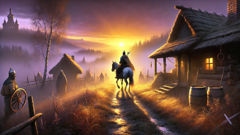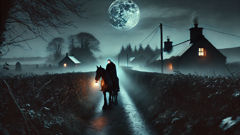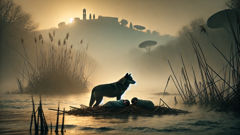Introduction
In the vast, rolling expanse of medieval Kievan Rus', where birch forests whispered old secrets and rivers carved their way through emerald plains, stories lived not only in the hearts of men but also in the bones of the land itself. The sun rose gold over domed churches and wooden villages, warming the frost from the rooftops and stirring the ancient magic that still lingered in forgotten glades. In this world, bravery was more than a virtue—it was a calling. And among those called was a young man named Dobrynya Nikitich, the son of a respected widow, a youth known for his quick smile and a strength that belied his gentle voice. His tale is etched into the very stones of Rus', a legend carried on the wind from Novgorod to Kiev, across the steppe and through the deepest woods. The people spoke of him around hearth fires, telling how he rode forth with little more than his mother’s blessing and a sword forged in secret, destined to clash with a foe so fearsome that even seasoned warriors dared not utter its name. For beyond the river Dnieper, where the hills were wreathed in mist and the shadows grew long, a dragon had awakened. Zmey Gorynych, with three terrible heads and scales like forged iron, swept down upon the land, scorching crops, devouring cattle, and spreading terror from village to village. And when the dragon’s hunger grew, it seized Princess Zabava, the Tsar’s own niece, carrying her away to a cave deep in the Black Mountains. None who followed returned. Yet as the bells of Kiev tolled their warning, Dobrynya—who had never seen battle, who had known the world only through songs and stories—set his jaw and prepared his horse. He looked to the dawn with courage burning in his chest, knowing that fate was calling him to ride not just for the princess, but for all of Rus', and for the promise that even the humblest soul might change the course of legend forever.
The Oath and the Road East
Dobrynya’s journey began not with a flourish, but with the quiet rituals of home. His mother, Malusha, stood before their cottage at the edge of the village, her hands trembling as she fastened his cloak. The world was silent but for the lowing of distant cattle and the faint tolling of bells from the church down the hill. She pressed a loaf of black bread and a flask of honey-water into his satchel, her gaze heavy with both pride and worry. “Remember, Dobrynya,” she whispered, “a true bogatyr wins not just with strength, but with heart. Listen well to those you meet, for wisdom often wears a plain face.”
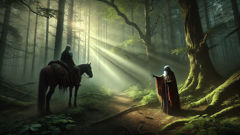
With these words echoing in his mind, Dobrynya mounted his sturdy horse—an animal of no great lineage, but loyal and swift. He passed through fields where peasants paused to watch, some crossing themselves, others offering quiet encouragement. The sky, still tinged with dawn, seemed impossibly vast. The stories of his childhood, sung by old bards and whispered by the hearth, felt both close and impossibly distant.
His first day’s ride carried him through meadows lush with wildflowers, across creeks that trickled with crystal clarity, and into the tangled arms of the forest. Each shadow seemed alive with possibility. It was here, beneath the spreading limbs of an ancient oak, that he encountered his first trial. A crone, hunched and gnarled as the roots themselves, blocked his path. Her eyes, sharp as winter ice, fixed on Dobrynya as she croaked, “What seeks a boy with the mark of destiny upon his brow?”
Dobrynya dismounted and bowed with respect. “I seek the dragon Zmey Gorynych, who has stolen our princess and defies our land.”
The crone nodded slowly, her fingers weaving through the air. “Then you must heed three warnings: Never stray from your road at dusk, never take shelter beneath the black pine, and never refuse a plea for help. Only thus may you find what you seek and return whole.”
Thanking her, Dobrynya pressed on, turning her riddles over in his mind. As the forest deepened, the path grew treacherous—roots tripped his horse, and strange calls echoed in the twilight. But he remembered the crone’s words, and when dusk fell, he camped openly by the riverbank, watching stars flicker above while the wind sang mournful songs through the reeds.
The next days brought new challenges: A wolf-pack trailing in the shadows, a swollen river that nearly swept him away, and a band of thieves who saw only a lone traveler ripe for plunder. To each, Dobrynya met with a mixture of courage, humility, and cleverness. He offered the wolves a piece of bread and a gentle word, and they turned away. He fashioned a raft from fallen logs to cross the river. With the thieves, he bartered rather than fought, trading an old medallion for safe passage.
On the fifth night, as a red moon rose, Dobrynya came upon a crossroads. There stood a battered signpost, its arms pointing east to the Black Mountains. Here, a young girl sat sobbing beside the road, her dress torn and her face streaked with tears. Remembering the crone’s warning, Dobrynya knelt beside her. She spoke of a lost lamb, vanished into the woods. Without hesitation, Dobrynya plunged into the undergrowth, braving thorns and brambles until he found the frightened creature trapped between roots. He returned it to the girl, who smiled through her tears and vanished into mist, leaving behind a single feather of shimmering gold.
Tucking the feather into his pouch, Dobrynya rode east beneath the stars, his heart lighter. The road was long, but each kindness along the way became another shield against fear. By the time the mountains loomed on the horizon, their peaks shrouded in storm, Dobrynya had learned that a hero’s journey is not just marked by battles won, but by compassion given and courage quietly sustained.
The Dragon’s Lair
The Black Mountains rose before Dobrynya like the walls of an ancient fortress—jagged, forbidding, and crowned with perpetual mists. The air was tinged with sulfur, and the wind carried whispers that seemed to circle back upon themselves. He paused at the mountain’s foot, feeling the enormity of his quest settle in his bones. The road behind him had been long and filled with trials, but the true test awaited within these shadowed peaks.
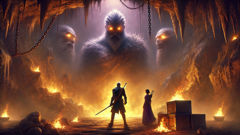
Climbing steadily, Dobrynya followed narrow paths that twisted through thickets of thorn and splintered rock. At times, he glimpsed strange runes carved into boulders or heard the distant echo of laughter—neither human nor wholly beast. His golden feather glimmered reassuringly in his pouch. When hunger gnawed at him, he chewed the last of his bread. When exhaustion threatened to overwhelm him, he rested in a shallow cave, trusting to the crone’s guidance.
On the third night in the mountains, Dobrynya found himself in a cavernous gorge lit by a strange, flickering glow. Here, the stones were scorched black and the grass was brittle as old parchment. The scent of smoke grew stronger. At the gorge’s center yawned a vast cave—its mouth wide enough to swallow a house, and from within came a rhythm like thunder: the steady breathing of something immense.
He crept closer, sword drawn, heart pounding. Peering into the darkness, Dobrynya saw Princess Zabava chained to a pillar of rock, her dress torn but her bearing proud. Her eyes met his across the cavern—defiant, unbroken. At her feet coiled the monstrous form of Zmey Gorynych. The dragon’s three heads lolled upon sinewy necks, their scales glinting with malice. One head slept, exhaling gouts of smoke; the second watched over its treasure—a heap of gold and silver; the third fixed its baleful gaze on the captive princess.
Steeling himself, Dobrynya stepped into the cave’s mouth. The dragon’s eyes snapped open, fire flaring in its throats. “Who dares disturb Zmey Gorynych?” roared the heads in unison, their voices shaking dust from the stone ceiling.
“I am Dobrynya Nikitich, son of Malusha,” he declared, “and I have come for the princess and to end your terror over Rus’.”
The dragon laughed—a sound like boulders grinding together. “Many have come. None have left.”
Before Dobrynya could reply, the beast lunged. Flames washed over him, searing the air. He rolled aside, feeling the heat graze his back. The cave filled with smoke and shouts—Princess Zabava crying out, the dragon’s heads snapping and weaving like vipers. Dobrynya struck at the closest neck, his blade ringing off scales hard as iron. The force of the blow staggered him; Zmey Gorynych retaliated with a sweep of its tail, hurling him against the cave wall.
For hours the battle raged—a blur of claws, fire, and steel. Dobrynya dodged and parried, using every ounce of skill and wit he possessed. When strength failed, he recalled his mother’s words and found new resolve. At last, remembering the golden feather, he drew it forth and slashed it across one of the dragon’s heads. The feather blazed with light, searing through the scales and blinding the beast. With a cry, Dobrynya drove his sword home, severing the head in a shower of sparks.
The dragon howled, reeling in agony, and turned its fury on Dobrynya. Flames roared; smoke billowed. Yet with every attack, Dobrynya grew bolder. He leapt onto the beast’s back, clinging tight as it thrashed and bucked. When another head lunged, he met it with steel and cunning. The final head, maddened and desperate, tried to bargain: “Spare me and I will grant you riches beyond measure!”
Dobrynya shook his head. “No treasure is worth the price of peace and life.”
With one final surge, he plunged his sword deep into the dragon’s heart. The cavern trembled as Zmey Gorynych let out a last, thunderous roar and collapsed in a heap of smoldering scales. The air cleared; silence fell.
Shaken and battered, Dobrynya approached Princess Zabava. He broke her chains, helping her to her feet. Though exhausted, she smiled—her gratitude shining through weariness. “You have freed me and saved Rus’. Who are you that you could do what no other dared?”
“Only a mother’s son,” Dobrynya replied quietly, “and a servant to our land.”
Together, they stepped from the cave into the dawn, leaving the darkness behind as hope returned to Kievan Rus’.
The Homeward Path and the Birth of Legend
The journey home began beneath a sky washed clean by rain, as if the land itself breathed a sigh of relief. Princess Zabava rode beside Dobrynya on a horse he’d tamed from the dragon’s own stables—an animal wild-eyed but strong. The world seemed transformed: villagers emerged from hiding to greet them, fields blackened by dragonfire began to bloom anew, and children danced in the roads at the sight of their savior and their princess.
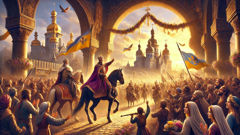
Yet even in victory, Dobrynya found no rest. Word of his deed traveled faster than the rivers flowed; at every crossroads, elders sought to hear his story, pressing him for details of the dragon’s defeat. He told the truth—of fear and doubt, of the crone’s warnings and the kindnesses that sustained him. He spoke of Princess Zabava’s bravery in captivity, her refusal to be cowed by despair. And always he credited his mother’s wisdom, for it was she who taught him that courage is forged as much in quiet moments as in battle.
In Kiev, the Tsar received them with great fanfare. Crowds thronged the city gates, cheering as Dobrynya and Zabava entered the square. Banners waved; bells rang. The Tsar himself descended from his throne to embrace his niece and thank her rescuer. Riches and honors were offered—gold enough to buy a kingdom, a place at the Tsar’s right hand, even Zabava’s hand in marriage.
But Dobrynya bowed low and refused them all. “What I have done, I did not for reward. Let these gifts be given to those who suffered most from the dragon’s wrath. Let peace return to Rus’, and let me return to my mother’s hearth.”
Princess Zabava, standing tall and proud, echoed his humility. She asked only that her people be cared for, that the wounds left by the dragon’s passage be healed with compassion and unity.
The Tsar, moved by their words, decreed a day of feasting and remembrance. Bards sang songs of Dobrynya’s deeds; artists painted his likeness; children played at slaying dragons in the city’s streets. Yet when the feasting was over and the crowds dispersed, Dobrynya slipped away quietly, returning at last to his village.
His mother met him at their door, tears shining in her eyes. No words were needed. She embraced him, holding him close as if to shelter him from all the world’s sorrows.
Seasons passed. The story of Dobrynya Nikitich grew into legend. Travelers carried it from village to village; old men recited it by candlelight; young boys dreamed of riding forth in search of dragons. And Dobrynya himself? He lived simply, working the land and helping his neighbors, never seeking glory or gold. Yet whenever trouble threatened Rus’, he would don his old armor and mount his horse—not for fame, but for love of his people and the promise he once made beneath an ancient oak.
And so, as long as there were shadows in the world and tales to be told by firelight, the name of Dobrynya Nikitich shone bright—a beacon of courage, humility, and hope in the heart of Russia.
Conclusion
The legend of Dobrynya Nikitich endures because it speaks to something universal—a truth older than the stones of Rus’ or the oldest birch in the forest. It reminds us that heroes are not born in palaces or forged solely by war. Sometimes, they rise from humble cottages and quiet hearts; they are shaped by kindness shown to strangers, by wisdom passed down in whispers, and by courage that refuses to be extinguished even when darkness seems absolute. Dobrynya’s triumph over Zmey Gorynych is more than a tale of victory against monstrous odds; it is a testament to the power of compassion, humility, and steadfast resolve. Whether in distant centuries or today’s uncertain world, his story invites us to believe that even the smallest gesture can change the fate of nations, and that legends are written every day—one brave choice at a time.

